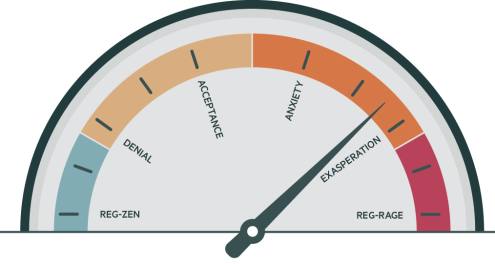Banking associations are mounting a legal challenge against the US Consumer Financial Protection Bureau’s new rule to cap credit card late fees to $8 from an average of $32 currently charged by financial services providers as a penalty for late payments.
The Consumer Bankers Association said on Friday that it is seeking legal routes to stop the rule in conjunction with other business groups including the US Chamber of Commerce and the American Bankers Association.
The announcement follows comments from the CBA’s CEO Lindsey Johnson, who said on March 5 that the rule would “benefit a small minority of frequent late-payers by offsetting the costs of their late payments by increasing costs amongst the 74 per cent of cardholders that pay their bills on time”.
The CFPB rule will reduce competition and increase the cost of credit; it will also result in more late payments, higher debt, lower credit scores and reduced credit access for those who need it most, said ABA president and CEO Rob Nichols in a public statement. He added that the rule will cap late fees at a level far below banks’ actual costs, forcing issuers to reduce credit lines, tighten standards for new accounts and raise annual percentage rates for all consumers, including those who pay on time.
PwC partner Sanchit Tiwari said he expects a reasonably significant cut in profits for US credit card issuers following the rule, which will push some institutions to look at other ways to offset some of the revenue shortfalls. “We expect some near-term pricing changes, increase in annual percentage rates, as well as some potential tightening of the credit box,” he said.
While the move attracted stark criticism, it also drew positive feedback from organisations and advocates for better consumer protection, including the national Consumer Law Center.
Tiwari added that the move has the potential to improve productivity in the industry, as companies will shift their focus on operational efficiency. “Every single time that we have seen these big watershed events, we have looked at them as an opportunity for the sector to innovate and to come up with new tools that can better serve consumers in the long run,” he said.
In a press release, the CFPB said the new rule aims to put an end to a mechanism that has brought over $14bn of additional profits every year to the pockets of big financial institutions.
According to the CFPB, the move will save an estimated $220 for the more than 45mn Americans who default on their payments every year.
In a statement, Rohit Chopra, director of the CFPB, said that the rule puts an end to the era where major credit card companies are “hiding behind the excuse of inflation and when they hike fees on borrowers and boost their own bottom lines”.
As stated by the CFPB, the $8 cap should be enough for credit card companies to cover costs arising from late payments, while also incentivising firms to make on-time payments easier for their customers, as it would cut profits from late fees. Entities will still be allowed to charge people more than the set threshold as long as they can justify that their decision matches collection costs.
articleSuggestion
In 2010, the Federal Reserve Board of Governors implemented the CARD Act, which ruled that credit card providers were only allowed to charge customers fees directly proportional to their costs linked to late payments.
However, firms have been able to take advantage of a regulatory loophole for over a decade, which allowed them to charge no more than $25 for first offences and a maximum of $35 for further missed payments, with fees also being adjusted for inflation, according to the CFPB.
Since the introduction of the CARD Act, the CFPB has found that charges for late credit card fees have been progressively increasing, amounting to 10 per cent of the $130bn-worth of fees and additional costs charged to consumers.
This week’s rule comes on the back of announced economic policies by the Biden administration designed to crack down on junk fees in a variety of sectors, potentially saving families billions of dollars. Such policies would include barring businesses across the economic spectrum from charging customers hidden fees, including hotels, rental companies and ticket sellers.
President Joe Biden reiterated his support for the cap during the 2024 State of the Union Address on March 7.
“Junk fees are something that the Biden administration has been talking a lot about over the years, including late credit card fees in that category as well,” said Eamonn Moran, senior counsel at law firm Norton Rose Fulbright. “So, from that perspective, we are finding out that credit card fees have become a part of a larger presidential initiative with respect to junk fees,” he said.












